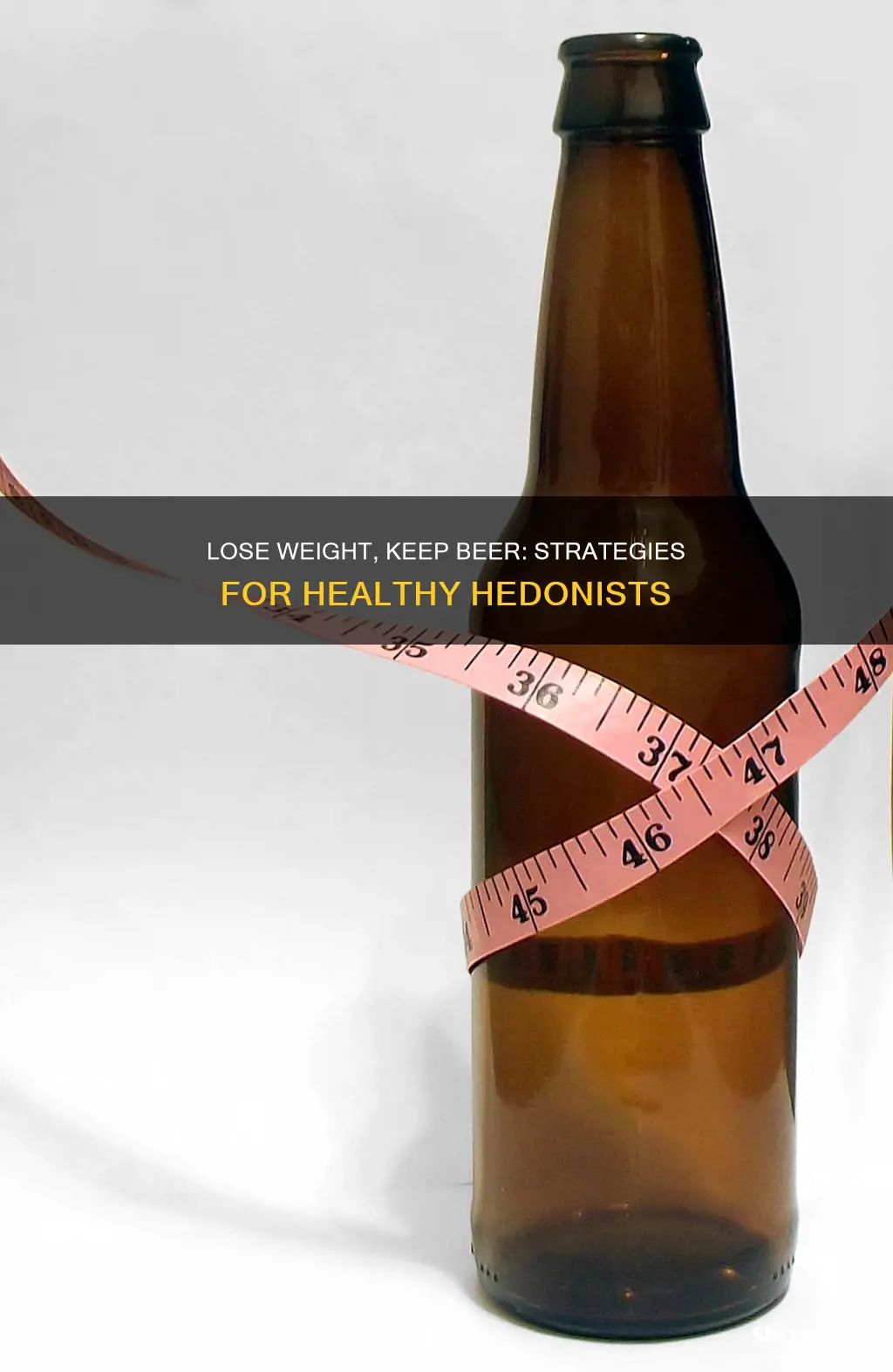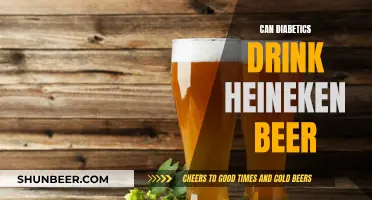
Losing weight while drinking beer is possible, but it requires discipline and a good understanding of how weight loss works. Weight loss occurs when you are in a calorie deficit, meaning you burn more calories each day than you consume. Beer is high in calories and can therefore make weight loss more difficult. However, it is not the beer itself that makes you fat, but your lifestyle choices. To lose weight while drinking beer, you need to set realistic targets, create a calorie deficit, analyse and adjust your diet, increase your NEAT (Non-Exercise Activity Thermogenesis), incorporate exercise, and assess and adjust your drinking habits. It is also important to remember that losing weight and being healthy are two different things.
What You'll Learn

Avoid binge drinking
Binge drinking is a serious issue, but it is preventable. Here are some tips to help you avoid binge drinking:
Understand the risks
Binge drinking is defined as consuming four or more alcoholic drinks within two hours for women, or five or more drinks within two hours for men. This type of drinking can have short-term and long-term negative consequences on your health, including increased risk of accidents, higher chances of contracting an STI, mental health issues, and alcohol overdose. It is important to understand these risks before deciding to drink.
Set clear limits
Decide on a specific number of drinks you will allow yourself to have and stick to it. For example, you could resolve to have only one or two drinks when you go out with friends. Write it down, set a reminder on your phone, or tell a friend about your intentions. This will help you stay accountable and avoid drinking more than you intended.
Practice moderation
Drink slowly and space out your drinks. It takes the liver about an hour to process one standard drink, so drinking more slowly will give your body more time to metabolize the alcohol. Alternating alcoholic beverages with non-alcoholic drinks, such as water or soda, can also help you pace yourself and avoid binge drinking.
Choose lower-calorie drinks
Opt for drinks with fewer calories, such as clear spirits with soda water or a glass of wine instead of sugary cocktails. Drinking lower-calorie beverages can help reduce the overall number of calories you consume, which may be beneficial for weight loss.
Avoid triggers
Identify situations or places that trigger your urge to binge drink and try to avoid them. For example, if going to bars or parties triggers your drinking, consider socialising in different environments or engaging in non-drinking activities. Finding healthier ways to manage stress, anxiety, or social situations can also help reduce the urge to binge drink.
Seek support
If you feel that you cannot control your drinking or are struggling to stop binge drinking, consider seeking professional help or joining a support group. Organisations such as Alcoholics Anonymous (AA) or Moderation Management (MM) can provide you with the tools and support you need to manage your alcohol consumption and prevent binge drinking.
Enjoying a Beer: Porch Drinking Laws and You
You may want to see also

Avoid binge eating
Binge eating is a common habit that many people experience from time to time. If you find yourself binge eating regularly, there are several strategies you can use to reduce the likelihood of it happening. Here are some tips to avoid binge eating:
Forget about fad diets
Fad diets that are overly restrictive can often trigger binge eating. Instead of following diets that involve eliminating entire food groups or drastically reducing calorie intake, focus on making healthy enhancements to your diet. Prioritize whole, unprocessed foods such as fruits, vegetables, and grains, and practice moderation with treats rather than excluding them altogether.
Avoid skipping meals
Skipping meals can contribute to cravings and increase the risk of overeating. Try to stick to a regular eating schedule and include a variety of nutritious foods. Drinking plenty of water throughout the day can also help curb cravings and prevent overeating.
Practice mindfulness
Mindfulness involves listening to your body and paying attention to how you feel. It can help you recognize when you are no longer hungry and adjust your eating accordingly. Practicing mindfulness meditation has been shown to decrease the incidence of binge eating and emotional eating. Combining mindfulness with cognitive behavioral therapy (CBT) may also improve eating behavior and self-awareness.
Add more fiber and protein to your diet
Increasing your fiber and protein intake can help reduce cravings, appetite, and food intake. Fiber-rich foods include fruits, vegetables, legumes, and whole grains, while good sources of protein include meat, eggs, nuts, seeds, and legumes.
Get enough sleep
Sleep affects your hunger levels and appetite. People with binge eating disorder (BED) often report more symptoms of insomnia than those without the condition. Aim for at least 8 hours of sleep most nights to help regulate your hunger hormones.
Start your day with a nutritious breakfast
Eating a breakfast rich in fiber and protein can help curb cravings and keep you feeling full throughout the morning. A high-protein breakfast has been shown to reduce hunger hormones more effectively than a high-carb breakfast.
Stay physically active
Adopting an exercise routine or increasing your physical activity levels can help prevent overeating. Regular exercise has been shown to stop binge eating in a significant percentage of participants in several studies.
Clean out your kitchen
Having a surplus of less nutritious foods in your home can make it easier to snack without moderation. Get rid of processed snack foods, candies, and pre-packaged convenience foods, and replace them with healthier alternatives. Stock your kitchen with nutritious options such as fruits, vegetables, protein-rich foods, whole grains, nuts, and seeds.
Plan your meals
Planning your meals in advance can help ensure you have the necessary ingredients to prepare a variety of nutritious meals. It can also help you stick to a regular eating pattern, which has been linked to fewer episodes of binge eating. Start by planning a few meals a week and gradually increase as you become more comfortable.
Keep a food journal
Keeping a journal that tracks what you eat and how you feel can be a useful tool. It can help you identify potential emotional and food triggers and promote healthier eating habits. However, food tracking may not be suitable for everyone, as it can sometimes increase the risk of disordered eating habits or contribute to an eating disorder.
Seek support
Talking to a friend or peer when you feel like binge eating may help reduce your likelihood of overeating. Having a positive social support system can help reduce the impact of stress, which may decrease your risk of emotional eating. If you don't have someone to talk to, helplines are available for free.
Beer Drinking: Is It Really That Bad For You?
You may want to see also

Drink water before, during, and after
Drinking water before, during, and after consuming beer is an effective way to prevent weight gain and stay hydrated, especially when drinking alcohol. Here are some reasons and tips to help you understand and implement this strategy:
Before Drinking Beer:
- Drinking water before consuming beer helps to keep you hydrated and prevents dehydration caused by alcohol's diuretic effect.
- Water in your system will make you feel less thirsty, prompting you to drink beer slowly and mindfully.
- Starting your night with a glass of water sets a good intention for moderation and can help you stick to your drink limit.
During Drinking:
- Alternating between beer and water helps to slow down your drinking pace and reduces the overall amount of alcohol consumed.
- Drinking water with your beer adds volume to your stomach, making you feel fuller and less likely to overeat or drink excessively.
- Water can be a great non-alcoholic option to have in your hand during social events, such as soda water with fresh lime.
After Drinking:
- Drinking water after consuming beer helps with rehydration and can prevent or alleviate hangover symptoms.
- Water can be a healthier alternative to a nightcap, improving your sleep quality and energy levels the next day.
- Staying hydrated the morning after drinking is crucial, especially if you plan to work out, as it aids your body's recovery process.
Remember, drinking water is just one aspect of a holistic approach to health and weight management. Combining this strategy with other healthy habits, such as a balanced diet and regular exercise, will help you achieve your weight loss goals while still enjoying the occasional beer.
Spinal Tap Procedure: Beer Drinking and Recovery Time
You may want to see also

Pick your calories
Beer is an "empty calorie" drink, meaning it provides almost no nutrients. It is also a liquid, which means you can drink calories very quickly. Beer also contains alcohol, which is metabolised by the body differently from other macronutrients like protein, carbs, and fat.
The foundation of losing weight is to eat fewer calories than you burn while staying full. That's why eating whole foods like meat, vegetables, and fruit, which fill you up but provide fewer calories, is such an effective strategy for getting lean.
If you want to lose weight while still drinking beer, you need to be mindful of the calories you're consuming. Here are some tips to help you pick your calories wisely:
- Choose lower-calorie beers: Opt for light beers or those with a lower % ABV. The higher the ABV, the higher the calories.
- Reduce portion size: Use a smaller glass or choose a 12-ounce can instead of a 16-ounce bottle.
- Drink less frequently: Limit the number of beers you have per week. Maybe stick to the weekends or have one beer a day.
- Choose lower-carb beers: If you're cutting carbs, go for beers like Michelob Ultra, Budweiser Select 55, or Corona Premier.
- Be mindful of food choices: Avoid eating high-fat or high-calorie foods while drinking beer. The excess calories from both the beer and the food will be stored as fat.
- Alternate with water: Rehydrating between drinks helps cut back on alcohol consumption. Try alternating each beer with a glass of water.
- Eat a healthy dinner: Eat a meal full of lean protein and good fats before drinking. This will help slow down the absorption of alcohol and may prevent binge eating later.
Beer After Dinner: A Healthy Choice?
You may want to see also

Drink slow and steady
Drinking in moderation and at a steady pace is a strategy that can help you balance weight loss and beer consumption. Here are some tips to help you drink slowly and steadily while managing your weight:
Be Mindful of Your Drinking Pace:
It's important to be aware of the speed at which you're drinking. Drinking slowly and steadily helps you savour the flavour of your beer and makes the experience more enjoyable. Take small sips and pause between each sip to appreciate the taste and aroma. This mindful approach not only enhances your drinking experience but also helps you consume less beer overall.
Set a Drinking Schedule:
Consider setting a drinking schedule to help you pace yourself. Decide in advance how many beers you plan to have and spread them evenly throughout the evening or event. For example, allocate a certain number of beers for a specific timeframe, such as one beer per hour. This way, you avoid drinking too much too quickly and maintain a steady pace.
Alternate with Non-Alcoholic Drinks:
One effective way to drink slowly and steadily is to alternate between beer and non-alcoholic beverages. Incorporate water, soda, or refreshing mocktails into your drinking routine. This helps keep your hydration levels up and fills your stomach, naturally slowing down your alcohol consumption. Drinking non-alcoholic beverages between beers can also prevent dehydration, which is often associated with excessive drinking.
Choose Lower-Calorie or Light Beer Options:
When trying to lose weight, opting for lower-calorie or light beer options can be beneficial. These beers typically have a lower calorie count, which can help you manage your overall calorie intake. By choosing lighter options, you can still enjoy the taste of beer while slowing down your calorie consumption. Remember to check the nutritional information on the beer labels to make informed choices.
Keep Yourself Occupied:
Engage in activities or conversations that can naturally slow down your drinking pace. When socialising, focus on interacting with others or participating in games or dances. If you're at home, try pairing your beer with a movie, a book, or a hobby that occupies your hands and mind. By keeping yourself engaged, you'll find that you drink at a more relaxed and steady pace.
Remember, drinking slowly and steadily is a simple yet effective strategy to enjoy beer while working towards your weight loss goals. Combining this approach with a healthy diet and regular exercise will help you create a balanced and sustainable lifestyle.
Does Beer Make Breasts Bigger?
You may want to see also
Frequently asked questions
Yes, it is possible to lose weight while drinking beer. Weight loss occurs when you are in a calorie deficit, so as long as you are burning more calories than you are consuming, you will lose weight. However, because beer is high in calories, it can make weight loss more difficult.
Beer bellies form when excess calories are stored as fat around the abdominal area. This is much more common in men than in women, as estrogen tends to divert body fat to the hips, thighs, and buttocks.
According to the National Institute on Alcohol Abuse and Alcoholism (NIAAA), moderate drinking is defined as up to four drinks per day for men and three drinks per day for women, with a maximum of 14 drinks per week for men and seven drinks per week for women.
Here are some tips to help you drink beer without gaining weight:
- Drink in moderation and stick to the recommended limits.
- Avoid binge drinking and eating.
- Choose lower-calorie beers or rotate with non-alcoholic or alcohol-free beers.
- Drink water before, during, and after consuming alcohol to stay hydrated and slow down your drinking.
- Eat protein-rich foods before or while drinking to help curb your beer intake and slow the absorption of alcohol.







